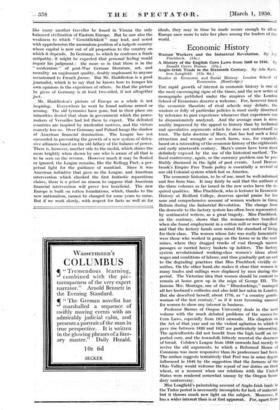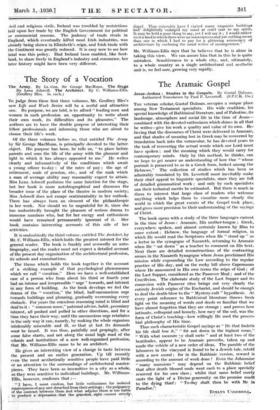Economic History
Women 'Workers and the Industrial Revolution. By Ivy ' Pinchbeck. (15s.) A History of the English Coin Laws from 1660 to 1846. By Donald Grove Barnes. (15s.) - THE rapid growth of interest in economic history is one of the most encouraging signs of the times, and the new series of monographs published under the auspices of the London School' of Economics deserve a welcome. For, however much the economic theorists of rival schools may debate, the wisdom or folly of particular policies is most easily discerned by reference to past experience Whenever that experience can be dispassionately analyzed. And the average man is more readily impressed by the appeal to history than by technical and speculative arguments which he does not understaiinor trust. •The false doctrine of Marx, that has had such a fatal attraction and wrought so much harm, was, for example. based on a misreading of the economic history of the eighteenth and early nineteenth century. Marx's errors have been Most definitely exposed by the use of the historical method.' the fiscal controversy, again, or the currency problem can be pro- fitably discussed in the light of past events. Lord Beaver- brook's Empire Free Trade, policy is essentially a revival of Our old Colonial system which lost us America.
The economic historian, to be of use, must be well-infoimed
and free from bias. It may fairly be said that the authors of the three volumes so far issued in the new series have the re- quired qualities. Miss Pinchbeck, who is lecturer in Econ-Omic History at Bedford College, deserves special praise for her sane and comprehensive account of- women workers in Great Britain during the Industrial Revolution. The change from the domestic to the factory system has often been represented, by sentimental writers, as a great tragedy. Miss Pinchbeck, on the contrary, shows that the woman-worker benefited when she found employment in a cotton mill or weaving shed, and that the factory hands soon raised the standard of living for their class. The women whose fate was really lamentable were those who worked in gangs on the farms or in the coal- mines, where they dragged trucks of coal through narrow passages or carried heavy baskets up ladders. The factory system revolutionized working-class women's ideas about wages and conditions of labour, and thus gradually put an end to the degrading practices that Miss Pinchbeck vividly -de- scribes. On the other hand, she makes it clear that women in many trades and callings were displaced by men during this period. The Victorian idea that women should be content to remain at home grew up in the reign of George - III. The famous Mrs. Montagu, one of the " Bluestockings," managed all her husband's collieries and also held her salon in London,
But she described herself, about 1770, as " a country gentle- woman of the last, century," as if it were becoming unusual for women to show any interest in business.
Professor Barnes of Oregon University deals in the next volume with the much debated problems of the succei:ive Corn Laws, especially from 1815 onwards:. His chapteiS on the Act of that year and on the violent agitation to which it gave rise between 1820 and 1827 are particularly interesting. The agriculturists did not benefit from the high tariff on
im- ported corn, and the townsfolk bitterly resented the dearness of bread. Cobden's League from 1838 onwards had merely to revive the old arguments, to which a Reformed House of Commons was more responsive than its predecessor had been. The author suggests tentatively that Peel was in some degree influenced in 1846 by the suggestion that the farmers Of the Ohio Valley would welcome the repeal of our duties on-their wheat, at a moment when our relations with the Unitcd States were rendered somewhat uneasy by the Oregon 'howl-
dary controversy. , - • - • -
' - Miss Longfield's painstaking account of Anglo-Irish 'Wide in the Tudor period is necessarily incomplete for lack of material, but it throws much new light on the subject. Moreover, it has a wider interest than is at -first apparent. For, apart from Avil and religious strife, Ireland was troubled by restrictions raid upon- her trade- by the-English Government for political or commercial reasons. The jealousy of trade rivals in E gland, which. eventually killed most Irish industries, was already being shown in Elizabeth's reign, and Irish trade with the Continent was greatly reduced. - It is easy now to see how fatal was this policy. Had Ireland been enabled, like Scot- land, to share freely in England's industry_and commerce, her later history might have been very different.

























































 Previous page
Previous page